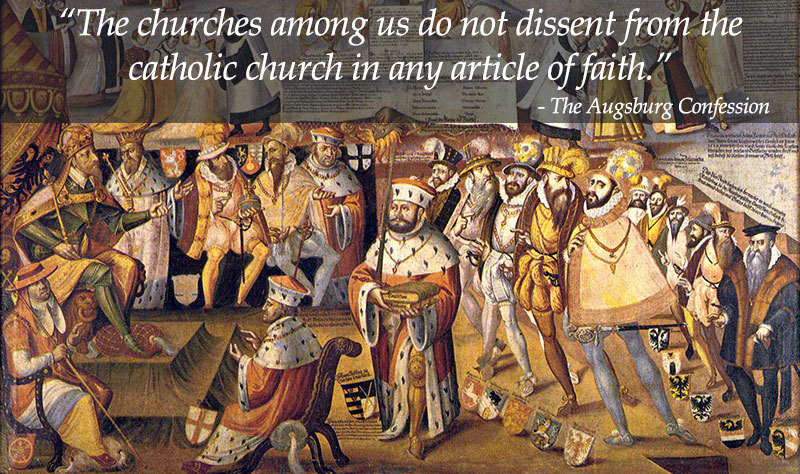Wed 25 Jun 2014
Lutheran fidelity to the catholic tradition
Posted by Mathew Block under Articles, Lutheran Leanings, Main
No Comments

On June 25, 1530 at the Diet of Augsburg, the Evangelical German princes presented The Augsburg Confession to theHoly Roman Emperor Charles V. This document, crafted by Philip Melanchthon, stands to this day as the principal explanation of what it means to be a Lutheran.
And what does it mean to be a Lutheran? Nothing more than that we are truly catholic Christians. We teach in accord with the Scriptures and with the Church’s faithful re-presentation of the Scriptures.
Wait… we’re catholic? What does that mean?
Find an answer in my new post over at First Things: “Are Lutherans Catholic?”
A small sampling:
Are confessional Lutherans catholic? Yes. And we always will be, so long as we hold fast to the traditions of the Apostles, written in the Scriptures and faithfully passed down to us by the Church. Consequently, I cannot help thinking that those seeking out a “Protestant Future” should in fact be looking to the Protestant Past. Looking for a church which faithfully receives the catholic tradition while clearly proclaiming the authority of Scripture? Looking for a church which is both sacramental and devoted to salvation by grace through faith alone? Looking, in other words, for an Evangelical Catholic Church? It already exists. It’s called Lutheranism.
———————
 So begins my most recent column for The Canadian Lutheran. It considers the increasingly secular culture in which Canadian Christians find themselves, and notes a rising intolerance towards Christians in our country. To be sure, this intolerance is not persecution in the strict sense of the term, I note; we do not face martyrdom the way some people—Mariam Ibrahim of Sudan, for example—do for professing faith in Christ. “Nevertheless,” I argue, Christians in Canada are also learning, if only a little, what it means to suffer for Christ.”
So begins my most recent column for The Canadian Lutheran. It considers the increasingly secular culture in which Canadian Christians find themselves, and notes a rising intolerance towards Christians in our country. To be sure, this intolerance is not persecution in the strict sense of the term, I note; we do not face martyrdom the way some people—Mariam Ibrahim of Sudan, for example—do for professing faith in Christ. “Nevertheless,” I argue, Christians in Canada are also learning, if only a little, what it means to suffer for Christ.”


